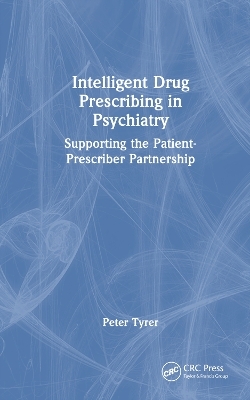
Intelligent Drug Prescribing in Psychiatry
CRC Press (Verlag)
978-1-032-61900-2 (ISBN)
This new book, drawing on the author’s distinguished career in front-line psychiatric practice, describes how to bring patient and prescriber together in an active partnership whereby there is better understanding of the positive and negative elements of drug prescription. At present there is a gap between expectations, with doctors not always able to admit their ignorance of some aspects of drug action, and patients kept unaware of these uncertainties. Balanced decision-making with joint involvement is needed to separate those drugs that are needed regularly to maintain health, those that are only needed when required and those that are mere fashion accessories. Greater care is needed over the explanation of the first prescription, the expected duration of treatment and the plans for eventual withdrawal. The consequence of a better partnership will be less over-prescribing, a reduction of polypharmacy and a lessened need for deprescribing, the planned systematic reduction of drug treatment that has got completely out of control.
Concentrating on routine prescribing for psychiatric and mental health disorders rather than unusual conditions and illustrated with real-life anecdotes and case histories, this is essential reading for trainee and practising psychiatrics, general practitioners and pharmacists.
Peter Tyrer is the Professor of Community Psychiatry in the Centre for Mental Health in the Division of Experimental Medicine, Imperial College, London, UK. His main interests are in models of delivering community psychiatric services, the classification and treatment of common mental illnesses, particularly anxiety and health anxiety, and the classification and management of personality disorders. He also leads on research into the management of patients with intellectual disability and on new psychological treatments for a common but largely unrecognised condition, health anxiety. He is experienced in the management of those with severe mental illness, substance misuse and personality disorder and has developed a new treatment, nidotherapy, to help these people by making environmental, not personal, changes. Much of his recent work has been concerned with improving and extending the concept of personality disorder. Personality disturbance is very common, not just in psychiatric practice, and this importance has been largely unrecognised as the classification system for this group of disorders is so poor. Fortunately, a major reform of classification is under way and will both simplify, and, we hope, destigmatise a very common form of mental distress.
Chapter 1. Models of drug action in psychiatry, Chapter 2. What should patients know about psychotropic drugs?, Chapter 3. What happens when drugs enter the body, Chapter 4. Essential elements to understand in prescribing, Chapter 5. Diagnosis and drug indications, Chapter 6. Personality and drug treatment, Chapter 7. The special problem of benzodiazepines, Chapter 8. The confusing world of withdrawal, Chapter 9. Drug prescription in young and older people, Chapter 10. Understanding the placebo response, Chapter 11. Deprescribing, Chapter 12. Prescribing policies, Chapter 13. Full list of psychotropic drugs and their indications,,
| Erscheinungsdatum | 22.08.2024 |
|---|---|
| Zusatzinfo | 5 Tables, black and white; 13 Line drawings, black and white; 13 Illustrations, black and white |
| Verlagsort | London |
| Sprache | englisch |
| Maße | 138 x 216 mm |
| Gewicht | 471 g |
| Themenwelt | Sachbuch/Ratgeber ► Gesundheit / Leben / Psychologie |
| Medizin / Pharmazie ► Medizinische Fachgebiete ► Pharmakologie / Pharmakotherapie | |
| Medizin / Pharmazie ► Medizinische Fachgebiete ► Psychiatrie / Psychotherapie | |
| Studium ► Querschnittsbereiche ► Prävention / Gesundheitsförderung | |
| ISBN-10 | 1-032-61900-7 / 1032619007 |
| ISBN-13 | 978-1-032-61900-2 / 9781032619002 |
| Zustand | Neuware |
| Informationen gemäß Produktsicherheitsverordnung (GPSR) | |
| Haben Sie eine Frage zum Produkt? |
aus dem Bereich


